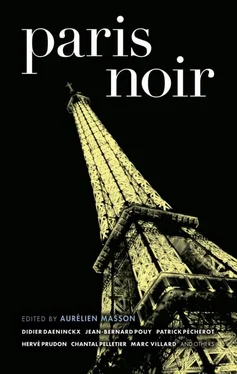Salim Bachi - Paris Noir
Здесь есть возможность читать онлайн «Salim Bachi - Paris Noir» весь текст электронной книги совершенно бесплатно (целиком полную версию без сокращений). В некоторых случаях можно слушать аудио, скачать через торрент в формате fb2 и присутствует краткое содержание. Город: New York, Год выпуска: 2008, ISBN: 2008, Издательство: Akashic Books, Жанр: Детектив, на английском языке. Описание произведения, (предисловие) а так же отзывы посетителей доступны на портале библиотеки ЛибКат.
- Название:Paris Noir
- Автор:
- Издательство:Akashic Books
- Жанр:
- Год:2008
- Город:New York
- ISBN:978-1-933354-63-7
- Рейтинг книги:3 / 5. Голосов: 1
-
Избранное:Добавить в избранное
- Отзывы:
-
Ваша оценка:
- 60
- 1
- 2
- 3
- 4
- 5
Paris Noir: краткое содержание, описание и аннотация
Предлагаем к чтению аннотацию, описание, краткое содержание или предисловие (зависит от того, что написал сам автор книги «Paris Noir»). Если вы не нашли необходимую информацию о книге — напишите в комментариях, мы постараемся отыскать её.
Paris Noir — читать онлайн бесплатно полную книгу (весь текст) целиком
Ниже представлен текст книги, разбитый по страницам. Система сохранения места последней прочитанной страницы, позволяет с удобством читать онлайн бесплатно книгу «Paris Noir», без необходимости каждый раз заново искать на чём Вы остановились. Поставьте закладку, и сможете в любой момент перейти на страницу, на которой закончили чтение.
Интервал:
Закладка:
“When?” asks Berthet.
“Say what you will,” says Morland. “When they start making pinot noir with this kind of expertise, there’s almost hope for the survival of the human race.”
“When?” repeats Berthet, who agrees on the zero dosage and the pinot noir as a sublimation of the vinous quality of the champagne and who even enjoys it, but who’s nevertheless somewhat upset by Morland’s information.
“When what?” says Morland, who pours them each another glass of champagne. “When are they going to kill you or when was the decision made?”
“Both,” says Berthet.
Berthet might say, Both, mon général, as the joke goes in the French army. Except that it wouldn’t be a joke. Morland is a one-star general, though not many people know it, and he probably hasn’t worn a uniform in thirty years. Morland’s cover is counselor to a European Commission member in Brussels.
Berthet and Morland look at each other.
At Chez Michel, you always feel you could be in the provinces. Rue de Belzunce is calm — a small, clean, narrow tear in the continuum formed by the Gare du Nord, boulevard Magenta, and rue Lafayette. The setting is pure Simenon. Berthet has never liked Simenon. Morland always has.
“I’m going back to Brussels on the Thalys train — come with me. We’ll plead your case...”
“That way, you’ll just have an easier time bumping me off.”
“You’re making me sad. I’m risking my life to warn you.”
They finish the champagne, the charcuterie. The fat of a Guéméné sausage relaxes Berthet, reassures him for a moment about the possibility of his body’s enduring power, almost as much as his 9mm Glock in the shoulder holster and his Tanfoglio .22 in its ankle case.
Berthet doesn’t answer. Berthet asks for the wine list. A blond waitress comes over. Berthet gets a hard-on. This is a sure sign. Death is on the prowl. Berthet concentrates on the choice of a white to go with the fricassée of langoustines with cèpes. Berthet decides on a Vouvray. Dry. La Dilettante, from Cathy and Pierre Breton.
The blonde says it’s a good choice, and Berthet wants to tell her that he’d be glad to eat her pussy.
“You’d be glad to eat her pussy, right?” says Counselor Morland.
Strange and specific kinds of telepathy exist between men who have been together a long time in close contact with state secrets and violent death.
Berthet thinks he’s going to die. Berthet knows he’s going to die, or is about to. The sudden hardness of his dick is a somatic sign that never fails to warn him. An even surer sign than Morland’s announcement.
Berthet gets hard for anyone, for anything, when death is near.
This began when Berthet was twelve years old, well before Saint-Cyr Coëtquidan military school, well before The Unit. His grandfather was being buried in a village in Picardy.
They’d had to take a train, from Gare du Nord to be precise. Berthet was as sad as if he were the one who had died.
Getting out of the taxi with his parents, Berthet had looked up through the rain at the statues with big boobs on top of the building. The statues represented international destinations. The ones lower down, in front of the vast windows, represented more local destinations. Their boobs were not so big, of course. Berthet had preferred the international ones. The big-boobs cities.
Cities where Berthet would go later on behalf of The Unit — London, Berlin, Vienna, Amsterdam — cities where he would manipulate, destabilize, lie, torture, assassinate, and cities where after all this, he would fuck desperately, seeking out women who resembled those statues, women huge, massive, firm.
To get to his grandfather’s funeral, they’d taken an old mainline train with sleeping compartments. Berthet, distraught by the first death in his life, had spent his time walking annoyingly back and forth past his sobbing mother to go jerk off in the train car’s toilet, mentally replaying to the rhythm of the tracks the images of the railway caryatids, their hard breasts, their arms against the gray sky.
When they buried his grandfather in the rain, which played its role perfectly in that cemetery on the outskirts of Abbeville, Berthet wept hot tears because he liked his grandfather, but also because his martyred prick was bleeding a little and he was afraid it would show on his black corduroys.
At the time, the Gare du Nord didn’t look like an airport you’d take to fly to the fourth dimension, a platform for freaks bound to the parallel worlds of dope, an accelerated state of homelessness, and social death. Their medieval-looking faces, their ulcers, their missing teeth, their foul smell of mass graves, their barely articulated speech, all of this was like living blame for thirty years of failure on the part of the welfare state.
At the time, the trains at the Gare du Nord were not designed for high speed, for the exclusive use of global elites.
Blue, gray, Bordeaux trains, phallic enough to make a Lacanian laugh out loud. And from these trains, men and women pour every hour now, looking busy with their laptops, their cell phones, their bodies full of benzodiazepines, antidepressants, alcohol, come, shit, and the latest figures marking the return on their investments in start-ups in Amsterdam or Copenhagen. Their bodies full of all these things, but not nicotine. You’ve got to draw the line somewhere: Cigarettes stink and smoking can kill you.
At the time, to intervene between those two mutant species, the Gare du Nord did not have mixed patrols of soldiers and uniformed cops, which always makes you think a coup is not far off. Besides, at The Unit, they know that a coup is never far off, that perhaps one is happening at this very moment, though no one knows it. A postmodern coup.
At the time, there were no battalions of special riot police either, transformed into ninja warriors meant to make the new market gap materialize once and for all — a digital divide to the end of time, unbridgeable, an end of the war of all against all. Neck-protecting helmets, opaque visors, Kevlar vests, padding at the joints, walkie-talkies constantly crackling.
And Berthet thinks that he has never liked the 10th ar-rondissement, and the Gare du Nord even less, the Gare du Nord as:
antechamber of the coup
prelude to civil war
back room of electronic fascism
warehouse of the death trade
laboratory of the apocalypse
Once again, Morland is telepathic: “When I arrived from Brussels a little while ago, I said to myself, walking along the platform, that everyone is now living in a permanent state of emergency and everyone thinks this is normal. No one can even remember what this place was like only twenty years ago. Better they don’t, or they would seriously start to panic.”
Morland interrupts himself. Morland burps from the charcuterie, but discreetly because Morland is a high-level intelligence bureaucrat, a classy one, not a bum.
“Fucking hell, Berthet, they’re really after your hide at The Unit...”
The blond waitress brings the bottle of Dilettante.
Berthet is still hard, Berthet tastes. The Vouvray is perfect, heartbreakingly perfect, even when you know that The Unit is ditching you and drinking wines like this one cannot go on much longer.
“You know why?” Berthet asks.
“Hélène. Hélène Bastogne,” says Counselor Morland.
They bring the fricassées of langoustines with cèpes. Berthet and Counselor Morland sniff.
It’s like a forest in autumn by the sea.
And then the windows of Chez Michel explode.
2
Berthet is lying on the ground. The fricassée is all over his suit. Berthet sees:
Morland, his skull topped off like a soft-boiled egg, holding his glass of Dilettante halfway to his mouth;
Читать дальшеИнтервал:
Закладка:
Похожие книги на «Paris Noir»
Представляем Вашему вниманию похожие книги на «Paris Noir» списком для выбора. Мы отобрали схожую по названию и смыслу литературу в надежде предоставить читателям больше вариантов отыскать новые, интересные, ещё непрочитанные произведения.
Обсуждение, отзывы о книге «Paris Noir» и просто собственные мнения читателей. Оставьте ваши комментарии, напишите, что Вы думаете о произведении, его смысле или главных героях. Укажите что конкретно понравилось, а что нет, и почему Вы так считаете.












